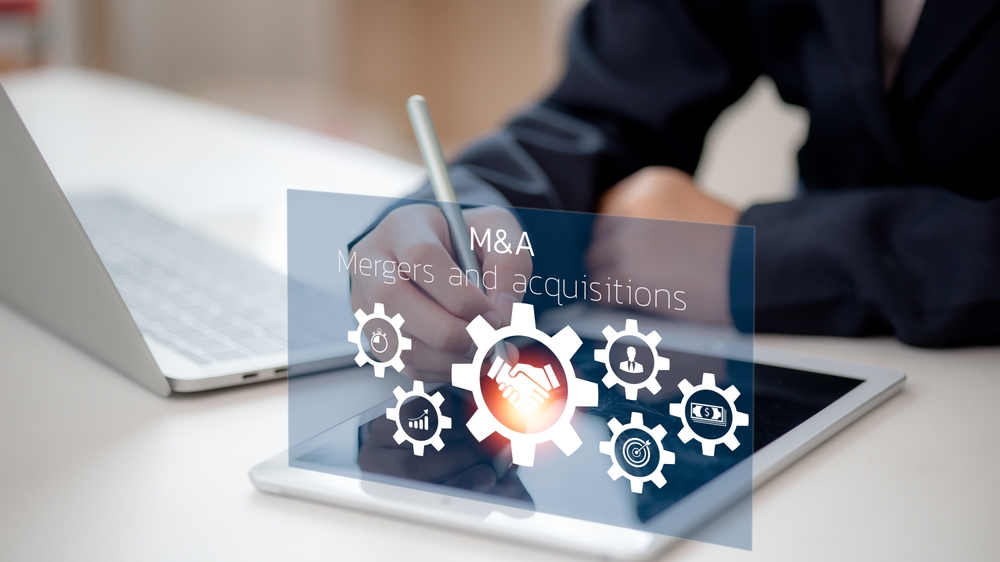
Mergers and acquisitions (M&A) create both opportunities and challenges for manufacturing companies. A critical aspect of a successful M&A process is the integration of company systems, data, and workflows. However, secure data transfer is a significant concern during this process for data protection and privacy.
During ERP integration, improper handling of sensitive information can lead to operational disruptions, compliance violations, and security risks. Therefore, we will explore best practices during M&A-driven ERP integration in this article. Read on to learn more about how secure data transfer protocols help ensure a smooth and safe transition.
[EDITOR’S NOTE: This article intends to provide information to readers regarding the importance of secure ERP data transfer protocols. This article in no way should be considered a single source of all information pertaining to mergers and acquisitions. Readers are encouraged to contact appropriate M&A consultants and legal counsel should they seek the advice of a professional.]
The Importance of Secure Data Transfer in Mergers and Acquisitions
Merging two manufacturing companies often involves consolidating ERP systems that manage financials, sales orders, customer relationships, and more. However, transferring vast amounts of sensitive data—such as intellectual property, employee records, and supplier contracts—poses security challenges.
Why Secure Data Transfer Matters in Mergers and Acquisitions:
- Preventing Data Breaches: Unsecured transfers can expose sensitive information to cyber threats.
- Ensuring Business Continuity: Disruptions in ERP data flow can impact production, inventory, and customer service.
- Regulatory Compliance: Manufacturing companies must adhere to industry regulations.
- Avoiding Financial and Legal Risks: Data leaks or improper handling may result in lawsuits, fines, or reputational damage.
A strong secure data transfer strategy helps the ERP integration go smoothly. This reduces any potential risks and allows the companies to continue operations without a hitch.
Guide for Secure Data Transfer During ERP Integration

Frontier ERP is equipped with secure data transfer protocols like end-to-end encryption and stringent user access features for smooth M&A ERP integration.
During a merger or acquisition, secure ERP integration requires a combination of technical security measures, compliance strategies, and careful planning. Here are the best practices to follow:
1. Conduct a Comprehensive Data Audit
Before transferring ERP data, both companies must evaluate their existing systems, identifying duplicate records, outdated information, and security vulnerabilities. A data audit helps streamline the integration process while reducing risks.
In addition to a basic risk audit, companies should conduct vulnerability mapping (e.g., penetration tests and assessments). This helps both companies feel comfortable on several fronts. These include data collection, how to use data after the merger, handling personal information, and a confidentiality agreement. This is important for managing reputation risks.
2. Implement End-to-End Encryption
To protect data in transit and at rest, encryption is essential. End-to-end encryption (E2EE) ensures that information remains secure throughout the transfer process, preventing unauthorized access.
3. Use a Secure Data Transfer Protocol
Choosing the right protocol is key to safeguarding ERP data transfers. Common secure transfer methods include:
- SFTP (Secure File Transfer Protocol): Encrypts files during transmission.
- VPNs (Virtual Private Networks): Creates a secure tunnel for data exchange.
- API-Based Transfers: Ensures secure and controlled data migration between manufacturing ERP systems.
4. Adopt Zero-Trust Security Principles
A zero-trust model ensures that every access request to ERP data is verified before granting permission. This reduces the risk of insider threats and unauthorized data exposure.
5. Perform Data Mapping and Validation
ERP systems often have different data structures and formats. Data mapping ensures consistency, while validation checks prevent errors or incomplete transfers.
6. Monitor Transfers in Real-Time
Continuous monitoring using intrusion detection systems (IDS) and security analytics helps identify suspicious activities during data migration.
7. Establish a Backup and Recovery Plan
Merger and acquisition transactions are complex, and data loss can occur. Regular backups and disaster protocols ensure that critical ERP data is not lost because of human error or cyberattacks.
Data Protection and Privacy Risks in Mergers and Acquisitions
Beyond the technical aspects, data protection and privacy laws pose significant challenges during ERP integration. Companies that fail to comply with regulations may face hefty fines, legal action, and reputational damage.
- Unauthorized Data Access: Multiple stakeholders gain access to ERP data during a merger or acquisition. They include employees, third-party consultants, and IT teams. Without proper access controls, sensitive financial records, customer details, and trade secrets could be exposed.
- Compliance Violations: Different countries and industries have strict data protection laws, as previously noted. Mishandling personally identifiable information (PII) or sensitive customer data can lead to compliance breaches.
- Data Residency Issues: Some jurisdictions have strict rules on cross-border data transfers. If ERP data is kept in a country with data laws, moving it without approval may be illegal.
- Insider Threats and Human Error: Employees from either company may unintentionally delete, modify, or expose confidential data, leading to data corruption or breaches.
Mitigating Data Protection Risks
- Implement role-based access control (RBAC) to restrict data access.
- Anonymize or encrypt sensitive data before migration.
- Conduct compliance assessments before initiating data transfers.
- Train employees on data security and privacy best practices.
Privacy Lesson from Marriott’s Acquisition of Starwood Hotels
While not involving manufacturing companies, this case shows just how important data security measures are during M&A.
In 2016, Marriott International completed its acquisition of Starwood Hotels & Resorts Worldwide. Along with Starwood’s assets, Marriott also inherited all of its existing liabilities—both known and unknown.
Shortly after the acquisition, Marriott discovered a massive data breach within Starwood’s reservation system. The breach had gone undetected for years before the merger. It exposed sensitive information from about 500 million guests, including names, addresses, passport numbers, and payment card details.
The backlash was severe — Marriott faced reputational damage, regulatory scrutiny, and significant financial losses. The incident highlighted an important lesson for mergers and acquisitions. Cybersecurity risks should be a top priority during due diligence. They are just as important as financial and operational assessments.
Legal Consequences of Non-Compliance
Failure to protect ERP data during a merger or acquisition can lead to severe financial and legal repercussions, including:
1. Regulatory Fines and Penalties
- GDPR Violations: Up to $20+ million or 4% of global annual turnover, whichever is higher. (GDPR applies to any organization that processes people’s data in the EU, regardless of location.)
- CCPA Violations: Fines of $2,500 per unintentional violation and $7,500 per intentional violation.
- HIPAA Violations: Fines range from $100 to $50,000 per violation, with a maximum of $1.5 million per year for repeated offenses.

No matter if you are integrating Frontier ERP or implementing the software for the first time, you can be assured that data security is our #1 priority.
2. Civil Lawsuits and Class-Action Cases
If a data breach occurs due to compromised ERP data, affected parties may sue for damages, compensation, and reputational harm.
3. Reputational Damage and Loss of Business Trust
Suppliers, customers, and investors may lose confidence in a company that fails to protect sensitive data. In turn, the companies could risk contract cancellations and reduced market value.
4. Criminal Liability
In serious cases, corporate leaders may face criminal charges. This can happen if they neglect data protection which leads to fraud, identity theft, or other cybercrimes.
Frontier ERP’s Secure Data Transfer Solutions
To help manufacturing companies navigate their ERP integration, Frontier ERP offers robust secure data transfer solutions that prioritize security, efficiency, and compliance.
Encryption, Monitoring, and Compliance
All ERP data in transit and at rest is encrypted to prevent cyber threats. Real-time monitoring helps companies identify any outside or internal threats. Frontier ERP’s robust analytics and reporting allows companies to ensure that they are meeting GDPR, HIPAA, CCPA, and industry-specific regulations.
Automated Data Mapping and Validation
Frontier ensures seamless integration between two ERP software systems, reducing errors. Unlike traditional EDI, Frontier DataBroker can streamline data collection and improve data quality from different formats, even EDI. These include traditional EDI formats like X12, XML, CSV, plain text files, and more.
Secure API-Based Integration
Frontier eWebServices streamlines data exchange between our ERP system and customer portal or site. Frontier’s real-time data processing enables controlled and audit-ready data transfers between platforms, ensuring online sites are always up-to-date with customer, product, and configuration data.
Frontier ERP also supports multiple sites, companies, and currencies. Read this article for more details.
Conclusion
Secure ERP integration is a mission-critical component of any successful merger or acquisition. By implementing strong data protection measures and using trusted platforms like Frontier ERP, companies can prevent security breaches, maintain compliance, and ensure a smooth transition.
Frontier ERP’s secure data transfer solutions provide peace of mind and regulatory compliance. Want to learn more? Contact us today to safeguard your ERP migration!




